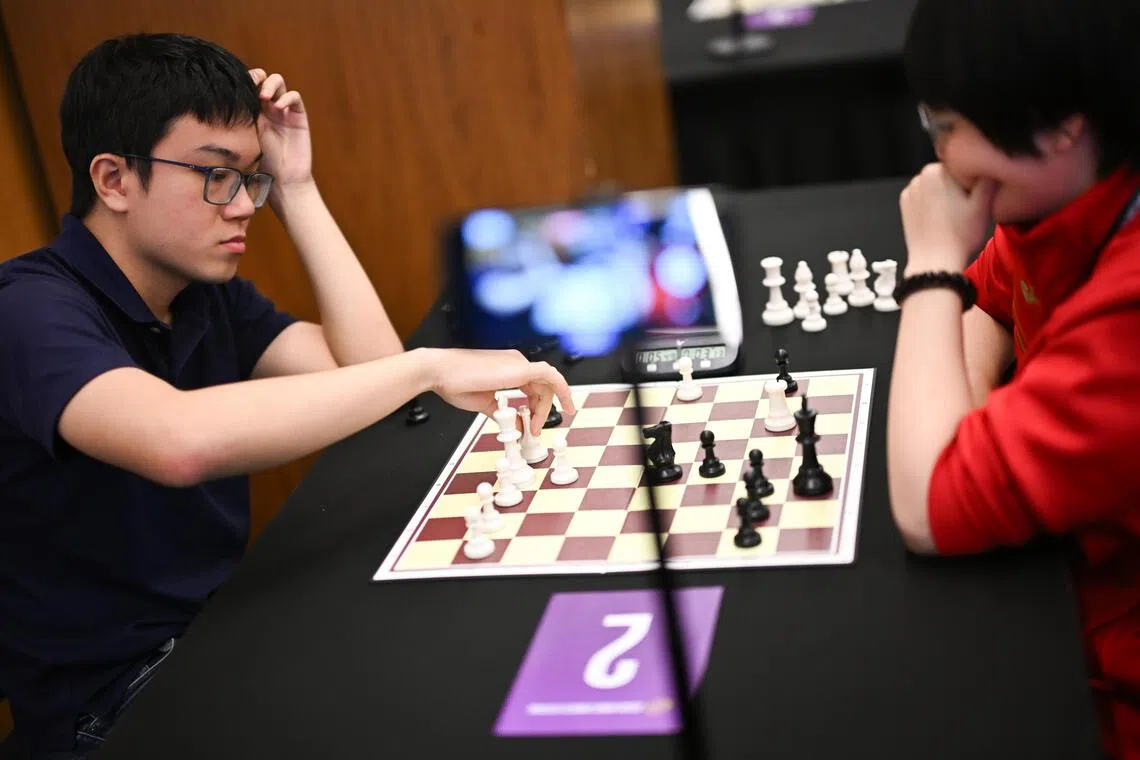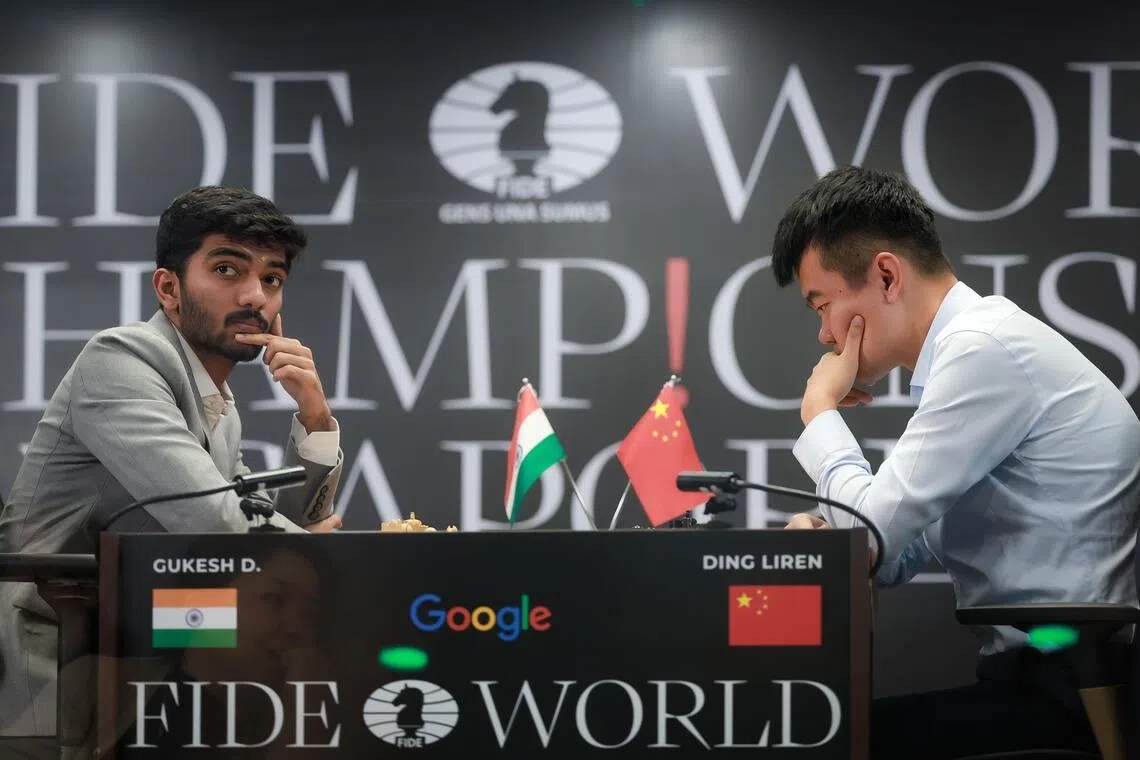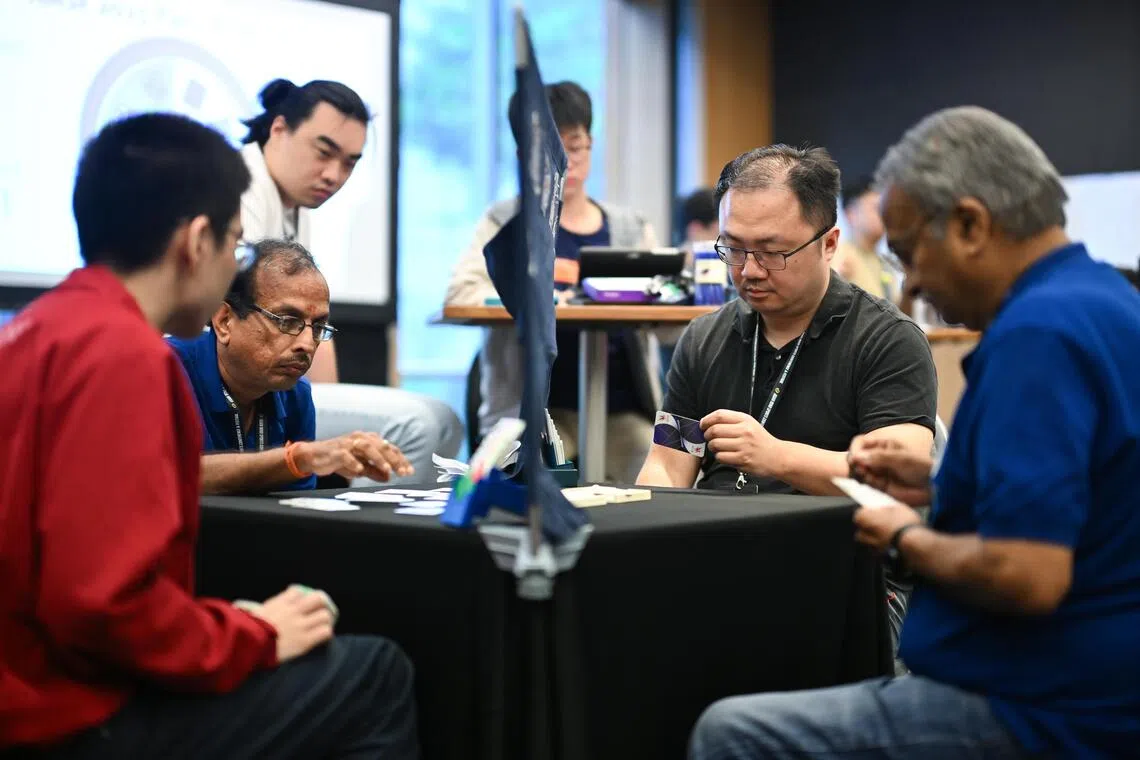The Big Question: Can chess, bridge and e-sports be considered sports?
In this series, The Straits Times takes a deep dive into the hottest sports topic or debate of the hour. From Lamine Yamal’s status as the next big thing to pickleball’s growth, we’ll ask The Big Question to set you thinking, and talking.
Sign up now: Get the biggest sports news in your inbox

Singaporean Grandmaster Tin Jingyao (left) going up against China's Yan Tianqi at the inaugural Asian Mind Sports Festival at Suntec Singapore Convention & Exhibition Centre on Nov 13.
ST PHOTO: LIM YAOHUI
- Singapore is considering formally recognising mind sports and e-sports as sports, as proposed in the Singapore Sports Council (Amendment) Bill.
- The debate continues, with athletes expressing varied opinions on whether mind sports and e-sports meet the criteria of a sport.
- Recognition could provide funding, credibility, and inclusion in major games, helping grow the mind sports and e-sports industries.
AI generated
SINGAPORE – Close to two decades ago, Kevin Goh found himself standing on a stage at the Nanyang Technological University (NTU), readying to deliver a speech to an auditorium of “super fit, very tough-looking” athletes.
The memory remains a vivid one for the chess player, who had then been named the 2005-06 NTU Sportsman of the Year – he was the first male or female from a mind sport to win the highest accolade in the award’s 15-year history.
And as he stood among his peers that fateful day, he saw an opportunity to challenge perceptions of what defines a sport.
Referencing his speech, Goh, now a grandmaster and the chief executive of the Singapore Chess Federation, said: “At the time, I basically mentioned that how one defines a sport could be a lot more holistic as compared to just whether one sweats or not. If you consider a sport as something where you compete against one another, whether it is one versus one or 11 versus 11.
“Whether you consider sport as something that combines aspects like discipline, resilience, focus, preparation, nutrition, sleep, psychology, sport science, whether these are all things that an athlete from a physical sport has to consider.”
Nearly 20 years later, the question of what constitutes a sport remains unresolved and the debate around whether mind games, and others like e-sports, should be considered sport still lingers.
The conversation gained fresh momentum after the Singapore Sports Council (Amendment) Bill was introduced in Parliament on Nov 4. Among other things, it seeks to formally recognise mind sports such as chess and bridge, along with e-sports, as sports.
The Bill was tabled for its first reading by Acting Minister for Culture, Community and Youth David Neo, and aims to update the roles and functions of Sport Singapore (SportSG) to better support Singaporeans’ diverse sporting aspirations.
Can mind games and e-sports be considered sports?
Chess is already recognised as a sport by the International Olympic Committee (IOC), while e-sports got the nod as a “sports activity” in 2017.
While neither are part of the Olympic programme, chess, bridge and e-sports have all featured in other multi-sport events.
Chess was first introduced to the SEA Games as a medal sport in 2003, before making its Asian Games debut three years later, while contract bridge appeared only once in the SEA Games in 2011 and was part of the Asian Games programme in 2018 and 2022.
E-sports became a medal event at the 2019 SEA Games and has been contested in every edition after. In 2023, it made its bow at the Hangzhou Asian Games.
Chess and e-sports also command massive audiences worldwide.
More than 600 million people play chess worldwide and the game boasts an enthusiastic fan base. The 2021 Fide World Chess Championship drew a record peak viewership of 613,000 concurrent viewers online.
Its stars have also become major figures off the chessboard – India’s reigning world champion Gukesh Dommaraju is a national hero, while Norway’s five-time world champion Magnus Carlsen, known for his outspoken personality, has two million followers on Instagram.
E-sports’ reach and revenues are also soaring. According to market research firm Statista, global e-sports revenue is projected to hit US$1.86 billion (S$2.42 billion) by 2025, nearly doubling the US$996 million revenue generated in 2020.
On Nov 8, the Honor of Kings 2025 King Pro League (KPL) Grand Finals was attended by 62,000 fans in Beijing’s Bird’s Nest stadium, breaking the Guinness World Record for the largest attendance at an e-sports match.
Even the IOC has got in on the act. In a bid to reach younger audiences, it held the inaugural Olympic Esports Week in 2023, although it featured virtual adaptations of sports, instead of popular game titles like League of Legends and Dota 2.
Yes or no?
SportSG’s recent move begs the question: Should mind games and e-sports be considered sports?
A poll conducted by The Straits Times with 20 local athletes from various sports showed the majority agreed, while six felt that they should not be classified as sports.
Ju-jitsu exponent Noah Lim feels a sport should pit participants against one another and involve some level of physical demand.
Drawing from his own experience playing chess, the 23-year-old noted that it can be physically draining, recalling that he has felt hungry after games.
He said: “I have so much respect for chess and e-sport players – I’ve tried those games and I know how much time and hours they put into it, they have to train as well in terms of the accuracy, or how to calculate steps ahead and reacting under pressure, so overall I do think they are sports.”
Sharing a similar sentiment, kitefoiler and chess player Maximilian Maeder pointed to the etymology of the word, sport, which comes from the old French word desport, meaning leisure or diversion and referring to any kind of amusement – not just physical activity – meant to carry people away from serious matters.
The 19-year-old Olympic bronze medallist said: “To me, I feel like sport is about chasing performance, it’s about the betterment of yourself and if you look at the core Olympic values – you meet with excellence, respect and friendship, none of which exclude something like a mind sport.”
National footballer Danelle Tan, who used to play chess competitively when she was younger, feels that it should be considered a sport, though not all games necessarily qualify.
The 21-year-old said: “I think chess is one of the purest forms of competition. There’s no referee, no dice roll, no luck. Just two minds testing each other’s skill and endurance. If sport is ultimately about human competition and performance, then chess fits that definition perfectly.
“With that said, however, I do think there’s a line somewhere that should be drawn. Not every game can or should be called a sport. But I’d rather see our definition of ‘sport’ evolve than stay narrow.”
The Nippon TV Tokyo Verdy Beleza forward added that recognising mind sports could help them grow, gain credibility, and reach bigger audiences.
Bowler Colleen Pee drew parallels with her own sport, recalling how it was once seen as a recreational activity.
The 20-year-old said: “Personally, I feel it can be taken into sports because it still requires some skills and also mental strength in order to compose yourself and be able to handle pressure during that situation.”
But others feel the lack of strenuous physical activity in mind games and e-sports makes it difficult to classify them as sports.
Sprinter Shannon Tan, 15, said: “I feel like sports are more physical, you have to use your body, and I feel like chess and all those mind games, you use your brain, it’s not really much of your physical body.
“You can train your mind and all that, but it’s a different kind of training as compared to sports. It’s not physical (to the extent) where you get tired and you’re on the floor panting.”
Another athlete who declined to be named said: “They can be competitive and mentally stimulating, but I think sports is something more physical. Maybe a part of e-sports may be considered if it comes down to (things like) reaction and speed.”
Why does it matter?
As the debate continues, Goh believes official recognition will bring benefits such as more opportunities for inclusion in major Games.
He hopes that it can pave the way for chess to be part of the National School Games, noting the game’s growing popularity among students, with over 1,700 children playing in the national schools’ individual chess championships annually.
Singapore also hosted the World Chess Championship in 2024, becoming the first South-east Asian country to do so since 1978.

India’s Gukesh Dommaraju (left) and China’s Ding Liren during Game 1 of the Fide World Chess Championship Singapore held at the Resorts World Sentosa on Nov 25, 2024.
ST PHOTO: GAVIN FOO
When asked what he would like to see if the Bill is passed, Goh laughed and said: “Am I allowed to say money makes the world go round? Definitely, funding is always going to be a problem. It’s always going to be the ask from every single national sports association.”
He added that there are ambitions to look for a permanent home for the Singapore intellectual game centre, which comprises four mind sports – weiqi, xiangqi, bridge and chess – that will allow them to expand their capabilities, organise workshops, more training sessions and more tournaments.
Singapore Contract Bridge Association president Luwen Koh believes official recognition could be an opportunity to showcase the game and correct misconceptions linking it and other card games to gambling.
He said: “It kick-starts the institutionalisation of mind sports as an engaging activity within the current sporting ecosystem that anyone can enjoy regardless of age or physical abilities. Mind sports offer a unique value proposition to segments of the community who enjoy intellectual stimulation in their daily lives.”
The push for greater recognition comes as Singapore hosts the first edition of the Asian Mind Games Festival and Conference this week, featuring five disciplines: chess, go, bridge, speed cubing and xiangqi.

(From left) Timothy Wu (Singapore), S Rajachandra (India), Zhang Yukun (Singapore) and T Sankar (India) playing bridge at the inaugural Asian Mind Sports Festival at Suntec Singapore Convention & Exhibition Centre on Nov 13.
ST PHOTO: LIM YAOHUI
Noting that recognition gives athletes “visibility, support and development pathways”, Asian Mind Sports Association president Gordon Tang said: “Mind sports already thrive globally, powered by online platforms and international championships.
“Official recognition simply accelerates growth and legitimacy, ensuring that intellectual competition is valued alongside physical sport.”
The e-sports fraternity has similar hopes. Singapore has already hosted major international e-sports events, including The International 2022 – the biggest global tournament for multiplayer online game Dota 2 with a prize pool of US$18.9 million – Mobile Legends: Bang Bang M2 and M3 World Championships in 2021.
Daniel Chew, head of e-sports for Singapore at video game developer and publisher Moonton Games – the company behind Mobile Legends – believes recognition will help to change public perceptions.
Noting that it is “an added tool or factor to talk to sponsors, talk to partners” and to get organisations like SportSG to “work together to push e-sports”, he added: “This a step in that direction, right? That it is becoming more synonymous with sports, that it is recognised by the Government.
“It’s not that if this Bill is passed, it suddenly unlocks a flurry of resources, but it’s an additional factor.”
Additional reporting by Joel Chang


